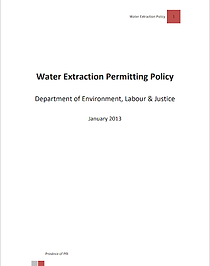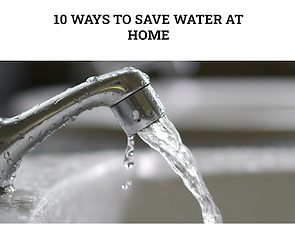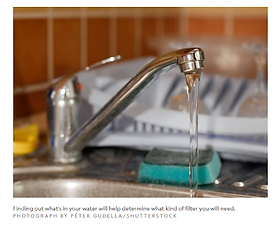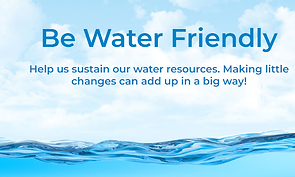
Water Conservation
Water Extraction
The City of Charlottetown uses the Winter River watershed as it’s primary source of municipal water. A small amount of water is still sometimes pumped from the old Malpeque pumping station (1888) located within the City of Charlottetown during times of peak demand. Over the years three wellfields were developed in the watershed: Brackley (1930), Union Road (1949), and Suffolk (1994).

However, the amount of water that is being extracted each year is too high. Local residents and the watershed group have noticed troubling evidence of this over extraction:




Source: Brian Higgins, CBC
Dry streams
Most commonly seen in the months of August and September, branches of the Winter River have been repeatedly observed to dry up, leaving no living space for the aquatic organisms.
Springs stop flowing
While summer months generally reduce the amount of water entering a stream, the impacts of over-extraction have resulted in a total stop of flow in certain springs which contributes to the drying of streams.
Decreasing Fish Stocks
Dried up streams leave little space for fish to live, additionally, shallower water with reduced flow heats up far quicker than a regular stream, which can disrupt breeding behaviour, particularly in Brooke Trout, an important species in our waterways.
A new water extraction policy has been developed that is based on reductions in the water flowing in nearby streams. Water extraction shouldn’t reduce the flow of water in the stream by more than 35% in an average summer. This policy is supposed to be more conservative of the water resource. However, we still have questions about how it will work in practice since the City pumps water from the Winter River all day, every day, the only way to determine what the stream flow would be naturally is through computer modelling. In several recent years, streams have gone completely dry, which would be a 100% reduction in flow – so an improvement would be welcomed.
Information on Water Extraction Policies
The previous guidelines for water extraction were based on the amount of precipitation that generally falls in an area each year. A sustainable amount of water extraction was deemed to be 50% of all the precipitation that falls in a year, called 50% of recharge. This policy is the one our association is more familiar with and has used in our watershed management plan. From the graphs below, it is clear that the City has been extracting more than this guideline. So reductions in extraction by the City will be needed to conform to either the old or the new provincial water extraction policy.


Since the new policy should be more restrictive in most cases, and it is hard to determine what an average summer stream flow would look like in the river without the extraction by the City, we will continue to use the 50% recharge values for illustrative purposes.
However, due to a grandfather clause, the City does not currently have to follow either of these policies. They are allowed to continue to take the same amount of water that they have been taking for years.
The Government of Prince Edward Island permits the City of Charlottetown to extract water at an unsustainable rate. In the City’s permit from the province, effective October 2010, it was stated that as no previous permit had been in place, the current permit would be based on the average daily pumping rates that approximately match the usage in 2009.
A new wellfield at Miltonvale Park became fully operational to supply water to Charlottetown in spring 2019. The aim is for this pumping station to reduce the stress on the Winter River, however, with the abnormal past few summers (very wet 2019, very dry 2020, very wet 2021) it is hard to say presently to what extent this pumping station is helping. Also, if consumption continues to increase, and the City keeps growing before too long yet another water source will be needed.
Charlottetown's Extraction Permit

Solutions
Water is being extracted beyond its capacity to recharge and to support its ecosystem, but we have solutions.
Watershed Residents can…
-
Show your enthusiasm for our association by becoming a member (Updated Membership Form) or supporter.
-
Volunteer with the watershed association and join our team!
-
Conserve water and learn about our new Water Conservation Program.
The City of Charlottetown can…
-
Develop a comprehensive policy and programs that result in significant water use reductions by residents and businesses.
-
Set annual targets for water reduction, so progress can be gauged (which we have long advocated).
-
Implement the Water Shortage Restrictions in a timely manner during dry weather.
City Residents can…
-
Talk to your City Councillor.
-
Get a low flow shower head, low flow toilet, and rain barrel. Sometimes the City has promotions to offer these items for discounted rates.
-
Use your water meter to check for leaks: instructions for Elster meter or Neptune Meter.
-
Encourage neighbours to follow recommended water restrictions and guidelines.
The Government of Prince Edward Island can…
-
Introduce strong regulations to support the Water Act, and hold the City of Charlottetown accountable to comply with the Act and regulations.
-
Strictly enforce other environmental rules and policies, such as crop rotation rules.
Water Conservation
Save water, join our water conservation efforts.
We cannot live without water. When there is a shortage of fresh water, people realize how precious it is. But rather than wait for a horrible drought or infrastructure malfunction to realize the value of water, we should always try to use it wisely.
Why is water conservation especially important in this watershed?
The City of Charlottetown gets most of its water from our watershed, and this export of water has a big impact on the ecosystem.
Water Conservation Tips
Indoor Initiatives
-
Turn off the tap when not in use (ex: brushing your teeth, washing dishes, shaving etc.)
-
Instead of leaving the sink tap running to rinse your dishes, fill the sink instead
-
“Navy shower” or shorter showers, less often – shut off the tap when lathering
-
Keep a jug of cool water in the fridge, instead of running the tap till it cools
-
When replacing appliances, choose low-flow, high-efficiency options
-
Fix leaks
-
Fill the bathtub halfway or less
-
Recycle indoor water and use it for plants
-
Wash full loads of clothes and dishes, use the shorter cycles
Outdoor Initiatives
-
Plant perennial shrubs instead of annuals (requires less water)
-
Fill pool once a season
-
Wash cars for safety only, (windscreens, windows and headlights) using a bucket (let the rain wash the rest of the car off naturally)
-
Avoid watering the lawn, and meet current water restrictions
-
Put leaves and bark mulch around shrubs and trees to hold in moisture
-
Water vegetable gardens in the morning, near the roots, and by hand
-
Sweep driveways or decks with a broom instead of the hose
-
Install a shut-off valve (spring-loaded nozzle) on your hose so it only runs when in use




.png)




